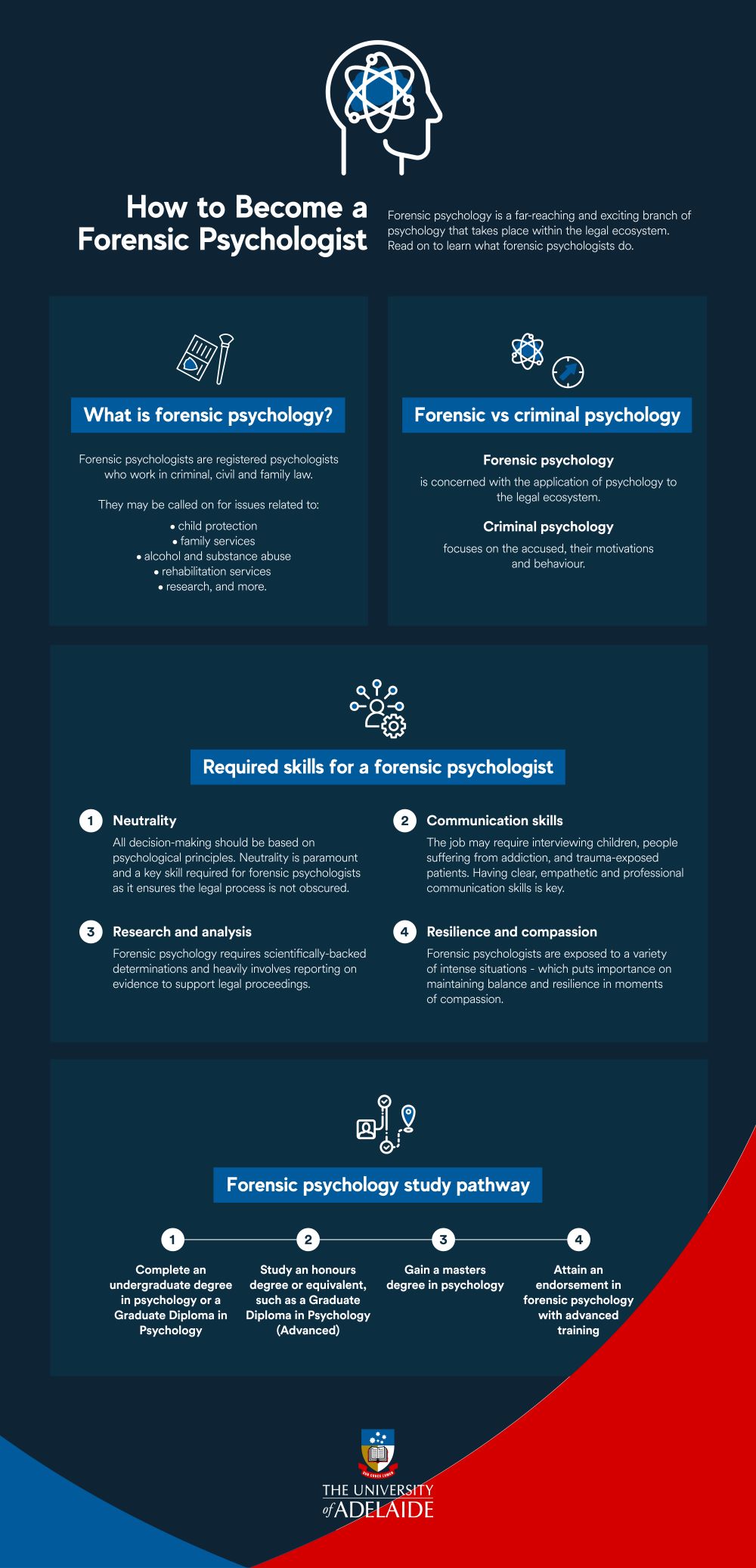How to Become a Forensic Psychologist
Psychology is a far-reaching field that encompasses many distinct specialisations. Each branch of psychology has a respective pathway you can explore to attain a role that aligns with your interests, and forensic psychology is no exception. Forensic psychology forms an essential part of the legal ecosystem and requires a passion for the mind within a legal context. If you find yourself drawn to the criminal justice system and want to know more about forensic psychology, read on.

What is forensic psychology?
Forensic psychologists are registered psychologists who have a specialisation to work in criminal, civil, and family law cases. They may be called upon to provide expert testimony regarding the accused, witnesses and evidence. Outside of the courtroom, forensic psychologists may play a pivotal role in criminal rehabilitation and counselling, designing correctional program research and more.
The Australian Psychology Society explains that forensic psychologists might be contracted for the following issues:
- child protection
- family services
- alcohol and substance abuse
- rehabilitation services
- research, and more.
What is the difference between forensic and criminal psychology?
Both forensic and criminal psychology takes place in a legal setting, however, there are a few distinctions between the two specialisations. Criminal psychology and criminology focus on the accused and the particularities of crimes, assessing their motivations and behavioural traits. It is worth nothing that criminologists may not hold a degree in psychology. Meanwhile, forensic psychology sits at the intersection of the fields of justice and psychology and is mostly concerned with the application of psychology to the criminal justice system.
Required skills for a forensic psychologist
This area of psychology requires individuals to carry themselves with sensitivity and professionalism while handling delicate subject matters. In the journey to obtaining a career in forensic psychology, the following skills will help you succeed and gain authority;
1. Neutrality
When working as a forensic psychologist in the legal field, it is crucial to remain neutral and strive for objectivity. It is not within the forensic psychologist’s scope of work to pass judgement, and personal biases must be set aside in order to carry out the role effectively. All decision-making should be based on psychological principles. Neutrality is paramount and a key skill required for forensic psychologists as it ensures the legal process is not obscured in any way.
2. Communication skills
Forensic psychologists require very strong communication skills as they often deal with cases concerning delicate topics and vulnerable individuals. The job may require interviewing children, people suffering from addiction, and trauma-exposed patients. Having clear, empathetic and professional communication skills will allow forensic psychologists to do their job without causing harm to individuals.
3. Research & analysis
Forensic psychology requires scientifically-backed determinations and heavily involves reporting on evidence to support legal proceedings. Having strong research skills will enhance your performance in this field, while also helping create solid report cases and ground all decisions in peer-reviewed reasoning.
4. Resilience & compassion
There is a very real and human side to this field. Forensic psychologists are exposed to a variety of intense situations - which puts importance on maintaining balance and resilience in moments of compassion. There is a level of distance required to maintain this stance and not become emotionally invested in legal disputes.
Take a step toward forensic psychology
If the above skills align with your interests and you believe forensic psychology is the right pathway for you, here’s some information on commencing your academic journey and understanding forensic psychology qualifications further:
- The typical route is to first become a certified psychologist and then attain an endorsement in forensic psychology. Endorsement requires advanced training approved by the Psychology Board of Australia and gives you additional expertise to work in a specialised field.
- Aspiring psychologists will undertake an undergraduate degree in psychology or a Graduate Diploma of Psychology online to do so.
- From there, students will move towards an honours-equivalent Graduate Certificate in Psychology (Advanced) online before entering a master's degree. This will lead a student towards general registration, and finally endorsement in forensic psychology.
Psychology requires a dedicated study pathway that will eventuate into a rewarding profession. Read more about the different pathways to becoming a psychologist here with the University of Adelaide. Studying psychology online will give you more time to find work experience and give you an edge when seeking an endorsement in forensic psychology. Become a forensic psychologist and play a key role in the legal industry.
Want to know more about different areas of psychology? Learn about Social Psychology here.
The Key Concepts in Social Psychology
Discover the key concepts of social psychology to understand the influences behind human behaviour.
Discover an Online Alternative to an Honours in Psychology
Take the next step towards becoming a registered psychologist & learn about studying an online honours-equivalent in psychology with the University of Adelaide.
